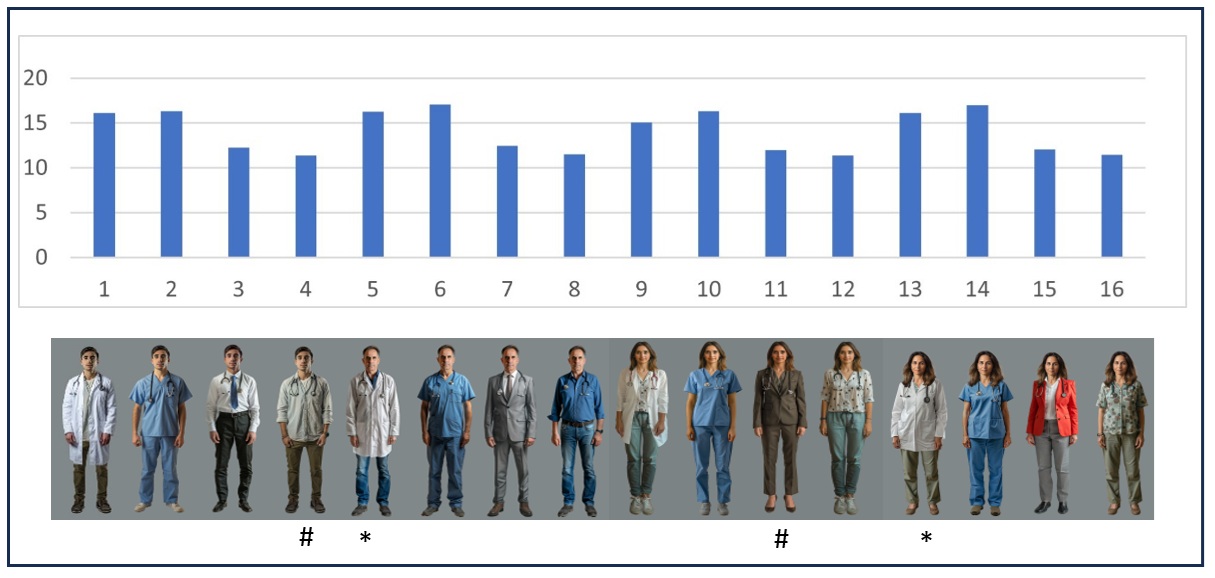Session Information
Date: Monday, October 27, 2025
Title: (1248–1271) Patient Outcomes, Preferences, & Attitudes Poster II
Session Type: Poster Session B
Session Time: 10:30AM-12:30PM
Background/Purpose: Physician sociodemographic factors and attire has been shown to influence patients’ trust. This study aimed to determine differences on patient perceptions of rheumatologist professionalism, empathy, reliability and medical safety.
Methods: A multicentre study was conducted from 1 December 2024 to 30 May 2025. Patients with chronic inflammatory arthritis (CIA) receiving biologic or targeted synthetic disease-modifying antirheumatic drugs (b/tsDMARDs) were recruited. Demographic and clinical information was collected. Patients completed a questionnaire evaluating 16 standardized photographs, each depicting a fictional rheumatologist with controlled features (race, posture, arm position, facial expression, and use of stethoscope) to minimize nonverbal communication bias. Each physician appeared four times, varying only in attire: formal office wear, scrubs, white coat, and casual clothing. Patients rated the physicians on four criteria—professionalism, empathy, reliability, and medical safety—using a 5-point Likert scale. Additionally, they were asked to select their most and least preferred physicians. A histogram of scores was generated. Statistical differences in sociodemographic preferences were tested with multivariate regression analyses.
Results: A total of 67 patients participated (median age 53 years; 68.6% women). Diagnoses included rheumatoid arthritis (43.3%), spondyloarthritis (34.3%), and psoriatic arthritis (22.4%). In the multivariate analysis of perception criteria, older physicians were rated significantly better than younger physicians across all dimensions assessed (p< 0.05). Among these, professionalism was the most highly rated attribute associated with older physicians. No significant differences were found in patient perceptions based on the physician’s gender for any of the evaluated criteria. Regarding attire, scrubs received the highest overall ratings [66.71 (SD 10.84)], followed by the white coat [63.59 (SD 11.88)], formal attire [48.80 (SD 18.04)], and casual clothing [45.76 (SD 20.70)]. Patients showed a clear preference for older physicians—both male and female—wearing white coats. Young male physician with casual attire and young female physician with formal office attire were least preferred physicians.
Conclusion: Patients with CIA perceived rheumatologists in scrubs or white coats as more professional, empathetic, reliable, and medically trustworthy than those in formal or casual attire. In addition, older physicians were preferred by patients. Rheumatologists may consider these contextual cues to enhance patient trust and engagement.
 Total scores for each physician. *Most preferred physicians; # Least preferred physicians.
Total scores for each physician. *Most preferred physicians; # Least preferred physicians.
To cite this abstract in AMA style:
LEON L, CANO L, MORENO E, CASTILLO G, CORRADI G, REDONDO M, CASADO M, FREITES D, TRUCHARTE A, UREÑA I, Abasolo Alcazar l. Dress for success: Influence of Rheumatologist Demographics and Attire on Patients with Chronic Inflammatory Arthritis Perceptions [abstract]. Arthritis Rheumatol. 2025; 77 (suppl 9). https://acrabstracts.org/abstract/dress-for-success-influence-of-rheumatologist-demographics-and-attire-on-patients-with-chronic-inflammatory-arthritis-perceptions/. Accessed .« Back to ACR Convergence 2025
ACR Meeting Abstracts - https://acrabstracts.org/abstract/dress-for-success-influence-of-rheumatologist-demographics-and-attire-on-patients-with-chronic-inflammatory-arthritis-perceptions/
